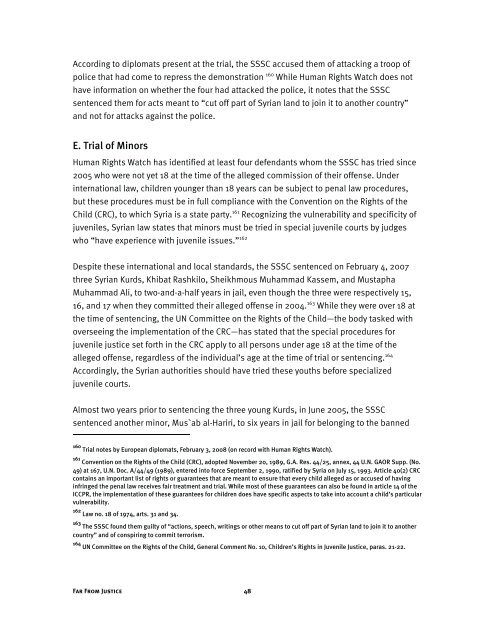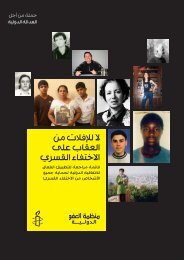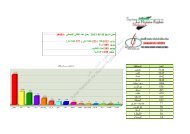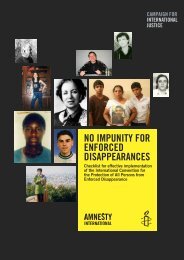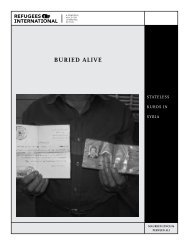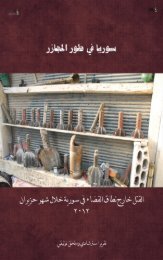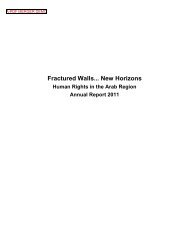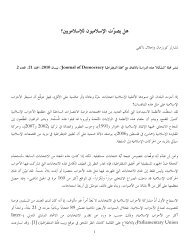Far From Justice - Human Rights Watch
Far From Justice - Human Rights Watch
Far From Justice - Human Rights Watch
- No tags were found...
Create successful ePaper yourself
Turn your PDF publications into a flip-book with our unique Google optimized e-Paper software.
According to diplomats present at the trial, the SSSC accused them of attacking a troop ofpolice that had come to repress the demonstration 160 While <strong>Human</strong> <strong>Rights</strong> <strong>Watch</strong> does nothave information on whether the four had attacked the police, it notes that the SSSCsentenced them for acts meant to “cut off part of Syrian land to join it to another country”and not for attacks against the police.E. Trial of Minors<strong>Human</strong> <strong>Rights</strong> <strong>Watch</strong> has identified at least four defendants whom the SSSC has tried since2005 who were not yet 18 at the time of the alleged commission of their offense. Underinternational law, children younger than 18 years can be subject to penal law procedures,but these procedures must be in full compliance with the Convention on the <strong>Rights</strong> of theChild (CRC), to which Syria is a state party. 161 Recognizing the vulnerability and specificity ofjuveniles, Syrian law states that minors must be tried in special juvenile courts by judgeswho “have experience with juvenile issues.” 162Despite these international and local standards, the SSSC sentenced on February 4, 2007three Syrian Kurds, Khibat Rashkilo, Sheikhmous Muhammad Kassem, and MustaphaMuhammad Ali, to two-and-a-half years in jail, even though the three were respectively 15,16, and 17 when they committed their alleged offense in 2004. 163 While they were over 18 atthe time of sentencing, the UN Committee on the <strong>Rights</strong> of the Child—the body tasked withoverseeing the implementation of the CRC—has stated that the special procedures forjuvenile justice set forth in the CRC apply to all persons under age 18 at the time of thealleged offense, regardless of the individual’s age at the time of trial or sentencing. 164Accordingly, the Syrian authorities should have tried these youths before specializedjuvenile courts.Almost two years prior to sentencing the three young Kurds, in June 2005, the SSSCsentenced another minor, Mus`ab al-Hariri, to six years in jail for belonging to the banned160 Trial notes by European diplomats, February 3, 2008 (on record with <strong>Human</strong> <strong>Rights</strong> <strong>Watch</strong>).161 Convention on the <strong>Rights</strong> of the Child (CRC), adopted November 20, 1989, G.A. Res. 44/25, annex, 44 U.N. GAOR Supp. (No.49) at 167, U.N. Doc. A/44/49 (1989), entered into force September 2, 1990, ratified by Syria on July 15, 1993. Article 40(2) CRCcontains an important list of rights or guarantees that are meant to ensure that every child alleged as or accused of havinginfringed the penal law receives fair treatment and trial. While most of these guarantees can also be found in article 14 of theICCPR, the implementation of these guarantees for children does have specific aspects to take into account a child’s particularvulnerability.162 Law no. 18 of 1974, arts. 31 and 34.163 The SSSC found them guilty of “actions, speech, writings or other means to cut off part of Syrian land to join it to anothercountry” and of conspiring to commit terrorism.164 UN Committee on the <strong>Rights</strong> of the Child, General Comment No. 10, Children’s <strong>Rights</strong> in Juvenile <strong>Justice</strong>, paras. 21-22.<strong>Far</strong> <strong>From</strong> <strong>Justice</strong> 48


